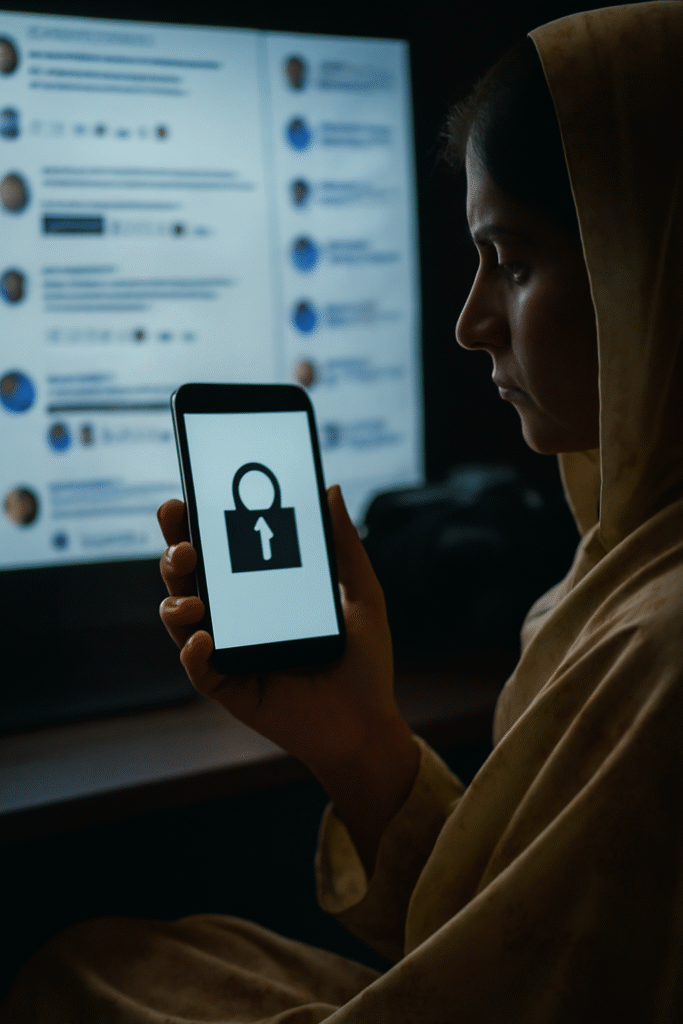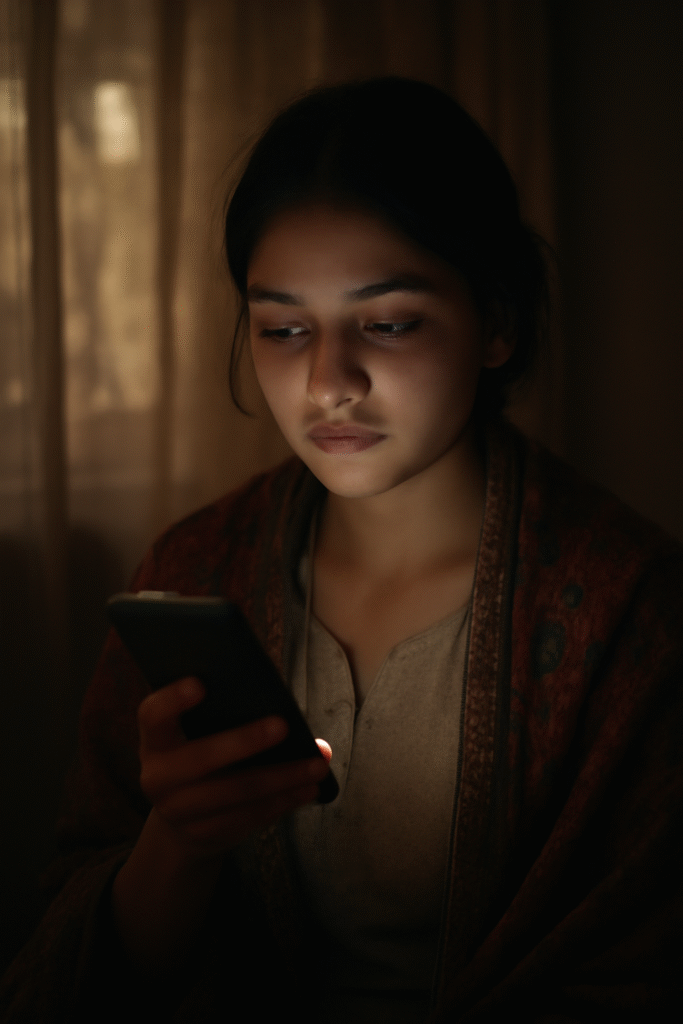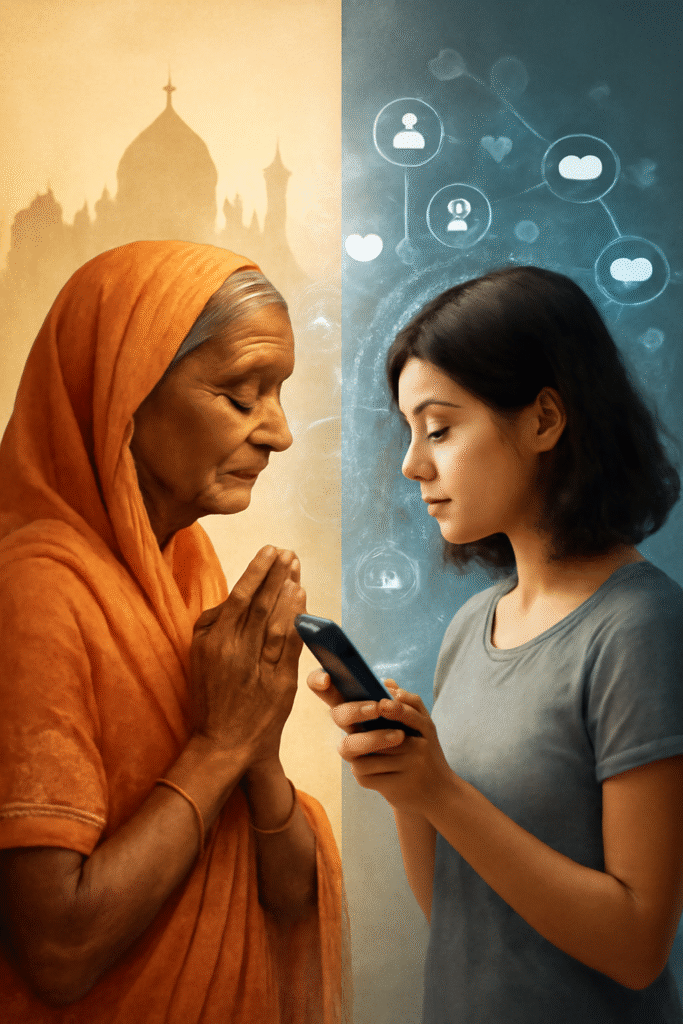Você já percebeu como, quase da noite para o dia, a ideia de “privado” se tornou pública?
Conversas, emoções, crenças e opiniões agora parecem viver expostas, flutuando em espaços digitais.
O que antes era íntimo — nossos pensamentos, nossos momentos, até nossos silêncios — tornou-se compartilhável, rastreável e, de alguma forma, lucrativo.
Habitamos um novo tipo de vida social, mediada por telas e algoritmos, mas ainda influenciada — e às vezes confundida — pelas tradições culturais que moldaram nosso senso de identidade, respeito e segredo ao longo de séculos.
O resultado é uma negociação contínua entre quem fomos e quem estamos nos tornando na era digital.

Um Convite ao Diálogo, Não um Manifesto
Vamos manter isto como uma conversa aberta.
Falar sobre privacidade digital e valores culturais em transformação não é chegar a conclusões definitivas — é examinar como vivemos, nos relacionamos e nos apresentamos aos outros.
Até pouco tempo atrás, a privacidade tinha uma dimensão física.
Fechávamos portas, lacrávamos cartas, guardávamos memórias.
Hoje, vivemos como se nossas casas fossem feitas de vidro transparente — conectadas por sinais de Wi-Fi em vez de paredes.
Temos fechaduras digitais, mas janelas que nunca se fecham por completo.
Limites que antes pareciam sólidos agora se tornam difusos.
Privacidade e visibilidade já não se colocam como opostos.
Muitos de nós nos expomos para existir — postando, narrando, documentando o dia a dia. E, ao fazer isso, redefinimos o que significa ser “visto”, “ouvido” ou até mesmo “real”.
Mas será que ainda sabemos o que pertence apenas a nós?
Será que lembramos do valor de um momento que não é compartilhado?
Quando a Exposição se Torna a Norma
As plataformas digitais prosperam com dados — os nossos dados: hábitos, preferências, emoções.
A economia atual se alimenta desses rastros invisíveis de informação pessoal.
E, por mais paradoxal que pareça, somos participantes ativos desse processo de auto exposição.
Oscilamos entre dois medos: o medo de sermos vigiados e o medo de desaparecer no anonimato online.
Vigilância e invisibilidade são ansiedades gêmeas do cidadão digital.

A Colisão entre o Mundo Antigo e o Novo
Toda cultura desenvolveu seus próprios códigos sobre o que é privado e o que é público.
Em muitas sociedades, a comunidade se sobrepõe ao indivíduo — compartilhar a vida pessoal é um sinal de pertencimento.
Em outras, a privacidade é tratada como algo sagrado, um espaço de autoproteção e introspecção.
A tecnologia globalizou e, com isso, embaralhou esses valores.
Hoje falamos sobre “direito à privacidade” e “liberdade de expressão” dentro das mesmas plataformas online, muitas vezes a partir de estruturas culturais radicalmente diferentes.
O que para alguém em um país parece “expressão autêntica de si”, em outro pode ser visto como “exposição excessiva”. Ainda assim, todos coexistem na mesma praça digital.
Gerações criadas nesse contexto híbrido aprendem a equilibrar éticas herdadas com normas digitais em constante mutação. O tradicional e o moderno já não se opõem — eles se sobrepõem. Estamos o tempo todo negociando como ser autênticos sem deixar de ser socialmente aceitáveis em um espaço que nunca para de registrar.
Quem Somos Quando Ninguém Está Olhando?
Aqui reside um paradoxo: quanto mais visíveis nos tornamos, mais buscamos “autenticidade”.
Queremos profundamente ser reais, apresentar nosso “verdadeiro eu”, mas o espaço digital transformou até a honestidade em uma espécie de performance.
Até nossas pausas — nossos momentos de silêncio — podem parecer declarações.
Então precisamos perguntar:
Ainda sabemos o que é verdadeiramente íntimo em nós, e o que apenas parece íntimo online?
E como essa conversa se conecta às tradições nas quais fomos criados — aquelas que nos ensinavam que existe um tempo de compartilhar e um tempo de silenciar?
Alguns defendem que estamos desenvolvendo um novo código moral da transparência, onde abertura equivale à virtude. Outros alertam que, sem mistério, solidão ou reflexão privada, a experiência humana perde profundidade.
Em muitas tradições espirituais, o silêncio carrega sabedoria. O recolhimento fortalece.
Mas a cultura digital incentiva o oposto — interação constante, resposta imediata, comentário infinito. Encontrar equilíbrio entre esses mundos talvez seja um dos maiores desafios culturais do nosso tempo.
Novos Valores Emergindo (E Nem Tudo Está Perdido)
Apesar dos riscos e do ruído, algo potencialmente positivo está surgindo.
Essa era digital nos obriga a pensar coletivamente sobre ética, consentimento e respeito.
Aos poucos — talvez de forma desajeitada — estamos aprendendo o significado de limites digitais, vulnerabilidade consciente e compartilhamento responsável.
Também testemunhamos atos de compaixão e solidariedade digital — redes de ajuda mútua, movimentos sociais e causas globais que conectam desconhecidos em torno de valores comuns.
Alguns dizem que a cultura está se fragmentando; outros veem transformação.
Talvez estejamos simplesmente reaprendendo a coexistir.
Cada clique, cada mensagem, cada reação carrega o potencial da empatia — ou do mal-entendido.
Nós escolhemos a frequência na qual sintonizamos.

Perguntas que Moldam Nosso Futuro
As respostas são escassas, mas as perguntas podem nos orientar adiante:
Quanto da minha vida preciso publicar para me sentir vivo?
Quando compartilhar se transforma em exposição?
Quais valores culturais merecem ser preservados — e quais precisam evoluir para a vida digital?
Sou eu quem conduz a tecnologia ou ela está, silenciosamente, me moldando?
Como privacidade e comunidade podem coexistir sem se anularem?
Essas perguntas não existem para acusar, mas para reconstruir.
A privacidade não é inimiga da conexão, assim como a tradição não se opõe à inovação.
Talvez o que precisemos seja uma ética digital do equilíbrio — uma ética que honre tanto a herança humana quanto as possibilidades tecnológicas.
Um Convite Final
Se estivéssemos frente a frente agora, eu perguntaria:
Como você se sente em relação a tudo isso?
Você acredita que ainda controla o que compartilha — ou a expressão digital se tornou um reflexo automático?
E quais elementos da sua formação cultural ainda influenciam suas escolhas online?
A verdade é que a transformação social e tecnológica está evoluindo mais rápido do que nossa capacidade de assimilá-la.
Por isso, o diálogo continua sendo essencial.
Refletir sobre privacidade digital e continuidade cultural não é apenas uma questão de dados ou algoritmos — é uma busca por significado. É sobre como desejamos viver, e conviver, daqui para frente.
Para Deixar Você Pensando
Talvez o desafio não seja escolher entre modernidade e tradição.
Talvez seja descobrir uma nova forma de ser humano — consciente, conectado, criativo —
Mas ainda inteiro dentro de si mesmo.
